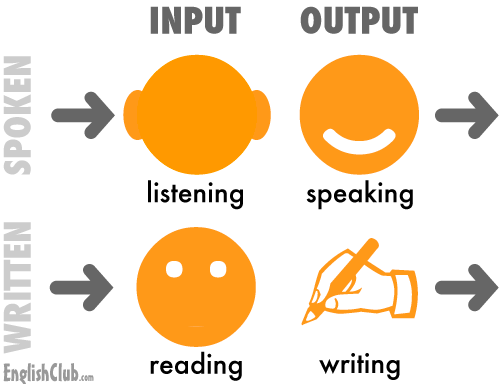This?list of 700 reasons to study languages, organized by?LLAS?in the UK, isn?t?news, but it did come as news to me while doing research for an upcoming post about?why?I think that?listening?is the?most valuable?language skill.
My hypothesis is still very much in the works (I have no hard data or calculations!), but it aims to position Listening as a more valuable language skill and better investment than Reading, Writing, and Speaking, in three related genres:
1. ?Learning and Maintenance
2. ?Technology
3. ?Employment

(Source: Englishclub.com)
Here?s a little preview of the first part of my argument.
I. ?Learning and Maintenance
Listening, both the capacity and the actual activity, has a higher ROI (Return on Investment) than the other language skills. ?For novice learners, listening is the only?logical?way to actually?first?get to know a new language; that is, of course, assuming you are not trying to learn (or ?decode?) a ?dead? ancient language like?Linear B. ?What?s more relevant is the idea that?motivation, retention, and repetition are highest?when one spends its language infancy in a state of listening, both active and passive. ?Of course, the other language skills are essential to one?s maturation. ?In particular,?Extensive Reading of appropriate level texts, as explained here by Dr. Alexander Arguelles, is indeed the best way to increase vocabulary range. ?Once one has attained a certain level of mastery or comfort, it is definitely possible to ?stay fit? in one?s languages by exercising Reading and Listening skills on a regular weekly basis.
Compare this to Speaking and Writing. ?Not only is it impossible to take your first step in a language by speaking or writing (even Antonio Banderas? character in The 13th Warrior must spend time listening to the Norsemen before he suddenly starts speaking). ?As output, Speaking and Writing require the hefty upfront cost of knowing the language, or at least how the language works, and being able?to imitate spoken and written forms. ?Nevertheless, some language learners, like Moses McCormick and Benny Lewis, suggest starting off by speaking from Day 1. ?Sure, it seems like the quick-fix for the impatient and textbook-weary, a true shot of adrenaline that gets you off your ass and out meeting new people and gaining new experience.
But it?s a hoax. ?It?s illogical and the ?speak from Day 1? proponents know it, for they admit that they have to memorize at least?some basic words and phrases before you hit the streets (Why else would Benny try to sell you a Language Hacking Guide? ?Take it from me ? don?t waste your time and money).
Otherwise, socializing with native speakers by trying to speak and write (or chatting online) is critical ? it?s just not the first step! ?It may take you a while before you start speaking and writing (if you do so at all), and that?s okay as long as your goal is not?about?imitating and thus being controlled by the language?but rather?about controlling the written and spoken language. ? Furthermore, once you do become fluent in the language, it?s as if the standard?for Writing and Speaking takes off like a rocket into the sky. ? After a certain point, the endeavor to get better?becomes increasingly challenging and time- and effort-costly; indeed, there is no satisfying auto-pilot mode for the ambitious writer or speaker.
================================================================
If you?re interested in this topic of Listening, I highly recommend checking out the work of Steve Kaufmann, who blogs here at The Linguist on Language.
Like this:
Be the first to like this post.
Source: http://orangeroomstudios.wordpress.com/2012/02/16/why-listening-is-where-the-moneys-at-a-preview/
day of the dead rocksmith blackbeard widespread panic widespread panic richard stallman richard stallman
No comments:
Post a Comment
Note: Only a member of this blog may post a comment.